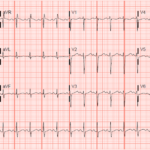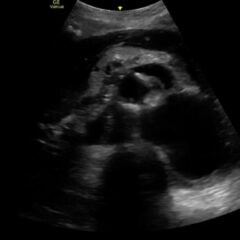Electrocardiogram Abnormalities Following Diphenhydramine Ingestion: A Case Report
ABSTRACT:
In the United States, tricyclic antidepressants (TCA) are commonly prescribed to treat psychiatric illnesses and neuropathic pain. This class of antidepressants has been found to cause pathognomonic electrocardiogram (ECG) changes in cases of overdose.1 Specifically, TCA’s cause a dominant terminal R wave in aVR and widening of the QRS complex due to their sodium channel blocking effect. Diphenhydramine, better known as Benadryl, is known to disrupt sodium channels in the same manner. In this case report, a 13-year-old female was brought into the emergency department (ED) after attempted suicide by diphenhydramine overdose. The patient presented with palpitations, nausea and confusion. She was agitated, tachycardic and exhibited opsoclonus. An ECG was performed upon the patient’s arrival which showed large terminal R waves in aVR along with large S waves in lead I indicating right axis deviation. Given the patient’s age and reported ingestion, it was highly suspicious that her symptoms and ECG changes were the result of a sodium channel blockade. Sodium bicarbonate was given, which resulted in notable ECG changes as well as symptomatic improvement. TCA’s, and similarly diphenhydramine, have sodium channel blocking properties which can be revealed by performing an ECG. Administration of sodium bicarbonate in the ED has been shown to be a successful treatment by reversing this sodium channel blockade.
Topics:
Tricyclic antidepressants, diphenhydramine, overdose, sodium channel blockage, sodium bicarbonate administration.






